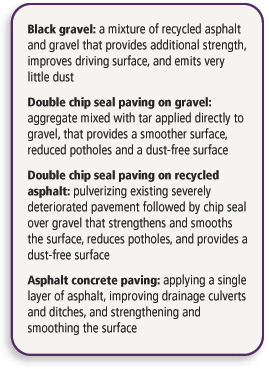
Making Our Dollars Go Further
As referenced in the department's original 5-Year Highway Improvement Plan document, in order to get the best value for our investment, we are taking a more balanced approach. While we will still continue to address the most severely damaged roads on a "worst first" basis, a larger portion of the highway improvement budget will be directed toward improving paved roads before they become severely damaged and require more costly repairs. Although we continue to face significant road improvement needs, this approach will ensure that funding is used in a more efficient and effective way.
This more balanced approach, using the latest treatment options and preservation techniques, will provide a number of benefits, including
- improving more roads in more communities
- providing a hard surface for more gravel roads
- paving smarter by preventing more costly problems before they happen
- improving more low-volume paved roads
 Pavement preservation
Pavement preservationPavement preservation involves extending the useful life of asphalt to improve smoothness, reduce potholes, and decrease rutting and cracking. This keeps the roads smoother and safer at a much lower cost than allowing them to deteriorate to the point of needing full reconstruction. There are various methods of pavement preservation, including(see right)
Surface stabilization
Local, low-volume roads
 Surface stabilization involves using a variety of
treatments to improve local road conditions,
resulting in smoother, dust-free road surfaces for
drivers. Options include(see right)
Surface stabilization involves using a variety of
treatments to improve local road conditions,
resulting in smoother, dust-free road surfaces for
drivers. Options include(see right)
The cost of roadwork has increased dramatically during the past number of years, so this year the Department of Transportation and Infrastructure Renewal will use its own chip-sealing crew in a few select locations. The department has determined that in many rural areas of the province a lack of competition in the paving industry has led to higher costs. In areas where there is little competition for paving jobs, prices have been at least 10 per cent higher (and even as much as 50 per cent higher) than in areas where there is more competition. That means Nova Scotians have paid higher prices for less work.
By doing some chip sealing itself, the department will pay less and pave more. Road builders will still have access to more than 95 per cent of all roadwork. They will still be able to operate a successful business in Nova Scotia. Next year, the province plans to introduce its own mobile asphalt plant, in rural areas where bids on tenders have become increasingly high due to a lack of competition.